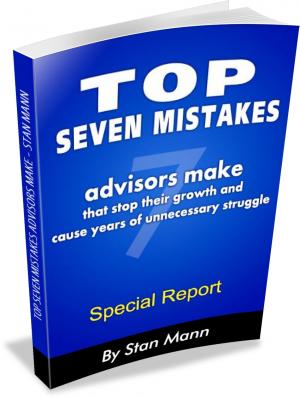Be Glad Selling Is Hard
 Do you avoid prospecting and selling?
Do you avoid prospecting and selling?
Do you hate selling or promoting yourself (marketing is mostly self-promotion)?
Wonder what you can do about it?
If you’re a business owner or financial advisor, getting more clients is essential for survival. You have to sell, but from talking to hundreds of business owners I’ve learned you hate to sell. You even avoid the word “selling.” You say you acquire new clients, or partner with, or form a relationship, or some other euphemism. No matter how you slice it, it’s still selling. It’s asking someone to do something important for you.
You may wish selling were easy, but if it were, your earnings would plummet. That’s because any minimum wage clerk could do it. You’d either be out of business [thumbs-up-woman] or forced to drastically reduce your fees to the minimum wage level.
And that’s why you should be glad selling is so hard.
The Problem
Having said that, why is selling so hard and what can you do about it? Let me illustrate with a true story.
My first encounter with the selling Dragon was when I was a 21-year-old green salesman for MetLife. I’ll never forget that day.
Mr. Gainer, my sales manager, was training me. We visited a policyholder to collect a premium. Gainer commented on the size of his policy and started explaining how burial costs had gone up. He said something about umbrellas and rainy days. It was a scripted sales talk the company used.
I knew what was coming. Gainer was going to ask the man to buy more insurance. I was surprised when my heart began to race. Then when Gainer asked the prospect to sign on the dotted line, my heart raced faster. Gainer asked for the money and my heart speeded up some more. When the prospect handed it over, I felt a thrill, my first sale, albeit by proxy.
At that moment I was hooked on the adrenaline rush – so far so good. Then things got hard when I tried to sell. My heart went into action and made me so nervous; I stuttered and made a poor presentation. When a prospect said no, I felt bad. I supposed it was disappointment for not making the sale, but it was more than that. Everything inside me became strangely heavy. Selling was hard. Making yourself prospect and sell took a lot of energy. I wanted to sell, earn a good living, but the reluctance kept holding me back.
Confused, I wouldn’t admit I was just plain scared. I made excuses. But when the end of the week was nearing with no sales to report to Gainer, I forced myself to prospect and sell. I usually succeeded. In fact, I did so well, I became the second highest producer in the district of 41 agents. I won all expense paid trips and little gold pins. Better yet, my bank account really grew.
It all came at the cost of high stress. I’ve talked before how I stuffed napkins under my armpits to keep my suit from being stained by my flop sweat.
But I was paid handsomely. Why? Because MetLife couldn’t find enough people to do what I did. Good salespeople were, and still are, in high demand and paid accordingly
Everybody’s afflicted with the fear of selling except sociopaths. If you’re a sociopath you’re probably laughing at what I’ve been writing. If you’re a regular Joe, like me, you know what I’m talking about. You’re coping with it every day.
As a business owner, you’re paid handsomely for making sales. The competition is relatively small (although it may not feel like it) because people fear selling. When they try, their emotions get in the way and stop them. Most business owners and financial advisors are faced with this unreasonable fear.
Writers have posed many opinions on why people are afraid of selling. I won’t go into those because it doesn’t help you solve the problem.
It’s enough to say sales reluctance is part of our cultural DNA, like public speaking.
The Solution
The good news is legions of people have overcome the fear of selling.
How do they do it? Most are determined enough to face their fear over and over. Eventually our mind and body adapts. The anxiety and stress diminish and selling becomes easier. It doesn’t work for everyone, some drop out and some burn out.
What does it take to have the fortitude and stamina to conquer sales reluctance?
First it takes a strong desire fueled by a compelling vision. This is the push. You become determined to succeed.
Then you need to work on your mindset. Begin by providing yourself support.
Start with your physical environment. Similar to an athlete, get rest, exercise and diet. Be in the best physical shape you can.
Practice meditation or yoga. It’s a key strategy. You can also pamper yourself with massages, hot baths and other soothing and relaxing activities to counteract the stress of selling. Selling causes physical stress as well as mental stress. These physical strategies combat that.
Then get emotional support from positive people who boost your self-esteem. The fear of selling is mostly the fear of rejection. The unconscious mind equates rejection of your services with rejection of you. It’s a message saying you’re not quite okay. You’re not acceptable. It’s a ding to your self-esteem. High self-esteem is essential for happiness and mental health. High self-esteem helps keep you going even when you’re not getting immediate results.
Next is mindset. You have a collection of emotional habits, beliefs, and attitudes. These are evidenced by our self-talk. When you’re feeling scared or reluctant, you’re telling yourself something to generate that feeling. Usually your self-talk is outside your awareness. You need to become aware so you can examine it for truthfulness. For instance, when you find yourself reluctant to make a follow-up call, you’re telling yourself something like, “I’m being a pest and ruining the chance of the sale.”
Examine this belief. Is it true? How do you know? Isn’t it just as possible he is open to your call but crazy busy like most people these days and that’s why he’s not replying to you? Might he possibly be grateful for your call? I’ve had prospects thank me for calling.
When you change your false negative belief for a true positive one, the reluctance melts away.
Usually you’re deaf to your self-talk and are unaware of your bad habits. That’s when an objective outsider is a big help. Exploring and challenging your self-talk takes self-awareness and work, but it’s well worth it.
One common bad habit you need to combat is quitting prospecting because you’re tired or discouraged. If you quit in the middle , you’re rewarding the reluctance and making it stronger. Plan ahead to stop when you complete a list or at a predetermined time of day. Don’t quit after a successful contact. Celebrate briefly and continue. At the end of the list or at the specified time congratulate yourself. Then give yourself a reward, an “atta boy,” a cookie, or a short break, just something you like.
I hope you found these tips useful. They are the basics. For more, you can read, “The Giant within You,” by Anthony Robbins or “TRIGGERS: A New Approach to Self-Motivation,” by myself, Stan Mann. It is published by Prentice Hall, a worldwide publisher of educational books.
Meanwhile, celebrate that selling is hard.
That’s why you are paid the big bucks (or will be when you overcome your selling reluctance).
What have been your blocks to success? Or do you reject the very idea that selling is hard. I’d love to hear from you.
Wishing you a rich and rewarding business and life,




 Tell a Friend
Tell a Friend Book a Meeting
Book a Meeting Contact Us
Contact Us